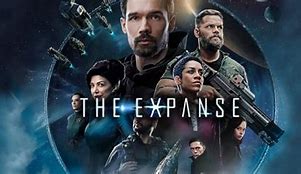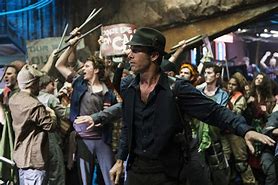

The Expanse Season 6, the last season, is now available and, in celebration, in anticipation, I started the whole series all over again. Yes, Remember the Cant and Detective Miller, my favorite character of the whole series and I am pledging undying love once more to Shoreh Agdashloo.

This is now my favorite TV series of all time. It just is. And it wins that distinction over some rather stiff competition, ranging from That 70s Show to Episodes. Not that I’m comparing an intense, scifi special effects show to well written comedies, merely showing where the Expanse fits in my TV Hall of Fame. Hmm. I suppose I should do a TV Hall of Fame post … later, later.

Why do I like it so much? Because it’s right up my scifi alley, a near-Earth epic that depicts the unchanging nature of humanity. It’s what used to be called ‘mundane’ science fiction but I’m not really sure that term is used anymore except derisively. I mean, who wants to be mundane? ‘Near-future’ scifi is probably the better term because it deals with events and possibilities of only a few hundred years out and locales within an au or four of Earth. The Expanse opens in the 2300s out past the asteroid belt and moves on from there. And boy does it move.
Rewatching the series, I’d forgotten how extraordinary it is. One of the advantages of old age, I suppose. It is tight and fast and nerve wracking, even the second time around. I mean, I know what’s going to happen when Holden and survivors of the Cant are taken aboard the Donnager, but it’s still nail biting all the way through the Rocinante’s escape. Right now I’m at the spot where Holden finds out Naomi did not destroy the protomolecule. And I know how that’s going to turn out, too. And I know where this whole train goes from there and I’m not sure I liked it. Where it went, I mean.
Because the entire nature and scope of the show changes radically after the remains of Eros lifts from Venus’ surface and creates the gates (and if I’m giving out spoilers, c’mon, these are old shows). I’m not really sure how I feel about that change. One of my scifi tenets is no extraterrestrial life. We are alone in this Universe and, yes, yes, the protomolecule was introduced rather early in the series, negating that principle, but it remained true to other principles in that the conflict was humans against humans with the proto as a tool. Once the molecule took on its own form and existence and revealed its purpose, however, we are no longer near-Earth but galactic. That is the point the show changed course, expanding its scope and turning into space opera or far future scifi.
Not that there’s anything wrong with space opera or far future scifi, love them both, but that’s not what we signed up for, sort of like John Snow turning out to be the King or Sidney working for the bad guys. It’s a paradigm shift, and pop psychology tells us we don’t like our paradigms shifted. Which is not entirely true; we can tolerate the shifts as long as they are shifted with skill. We’ll miss the old one, but look forward to the new day.

And that’s my stance on this show. Of course I miss the days of the Rocinante desperately trying to prevent war between Earth and Mars, but look at all those gates out there and the worlds calling us. And, yes, it’s not just the protomolecule but whatever destroyed the protomolecule’s makers that is now a worry. Things escalate, concerns get bigger, and maybe that is as good a point as any to let the show drift into its own gate.
Not that Season 6 ends my Expanse addiction. I still have the remaining books to go, the last I read being Nemesis Games, so I’m not done with the crew of the Rocinante by a long shot.
In the meantime, I’ll strap in, hold on, and enjoy what’s left of the ride.